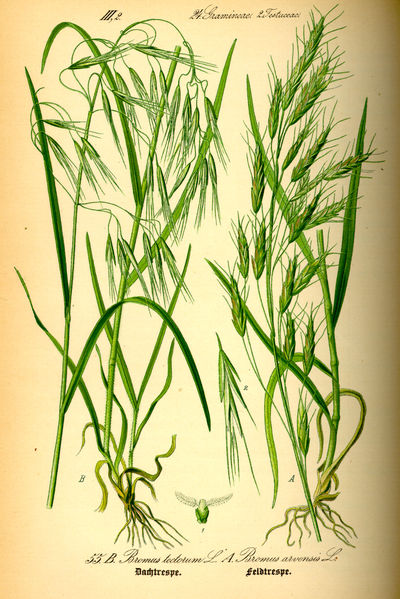In ecology news: bats, antbirds, wildfire recriminations, and retractions
by Liza Lester, ESA communications officer

Cheatgrass, Bromus tectorum, evolved in the old world, but has been very successful in the new, with a talent for colonizing disturbed rangeland. It fuels early season range fires. Credit, Prof. Dr. Otto Wilhelm Thomé “Flora von Deutschland, Österreich und der Schweiz,” 1885. http://www.biolib.de/
Bats & Birds (& Ants)
The Nature Conservancy has built a bat bunker, a cleanable, climate-monitored refuge, near Bellamy Cave in TN. They’re hoping the clean cave can buy time for immunity or science to intervene in the deadly fungus outbreak sweeping through North America, attacking bats in their sleep. Awake, bats resist the infection. But in hibernation, slow metabolism, low body temperature, and the close press of companions make the bats vulnerable.
- James Gorman “Building a Bat Cave to Battle a Killer” NY Times – 24 Sep 2012
Antbirds trail after army ant swarms, stealing the ants’ hard earned harvest of grasshoppers, beetles, and spiders. Butterflies follow the birds to eat their poop. Natalie Angier talked to ecologist Janeene Touchton in Panama, and cited Touchton’s and James Smith’s 2010 paper in Ecology.
- Natalie Angier “Feathered Freeloaders at the Ant Parade.” NY Times 24 Sep 2012
- Species loss, delayed numerical responses, and functional compensation in an antbird guild. Janeene M. Touchton and James N. M. Smith. Ecology 2011 92:5, 1126-1136
Tempers ignite over wildfire management
Bill Baker of the University of Wyoming says megafires predate fire suppression, logging, and other management interventions blamed for recent conflagrations in North America – contradicting current management practices and a larger body of research. In a podcast, intern Emily Guerin describes (unsympathetically) vitriol from wildfire ecologists toward Baker’s position on fire in the west. Nature told a more canonical story about how “Forests in the American west are under attack from giant fires, climate change and insect outbreaks. Some ecosystems will never be the same.”
- Emily Guerin “Fire scientists fight over what Western forests should look like.” High Country News 17 Sep 2012.
- Cally Carswell, Emily Guerin, Neil LaRubbio “West of 100: Fire & Brimstone.” (audio) High Country News 25 Sep 2012.
- Mark A. Williams and William L. Baker Testing the accuracy of new methods for reconstructing historical structure of forest landscapes using GLO survey data. Ecological Monographs 2011 81:1, 63-88
- Michelle Niihuis “Forest fires: Burn out.” Nature News 19 Sep 2012
Ira Flatow, on location at Boise State University, was also talking about wildfire last week. “Nearly a million acres are burning in the West right now.” Range fires. Who’s to blame? Is this a new thing? Today, we’re blaming Cheatgrass. Flatow talks to Jen Pierce, a paleo fire ecologist, and Mike Pellant, of the Great Basin Restoration Initiative.
“When does Cheatgrass become native?” asks audience. Answer: it’s a naturalized part of the rangeland. There are many naturalized non-native plants, but Pellant thinks Cheatgrass isn’t one we want to live with.
In the second hour, the discussion turns to raptor biology of the Snake river bluffs and plains. And the Pleistocene megafauna of North America, with hypotheses of extinction—including the possible role of human hunters. [“Was it a scary time?” “Ira, maybe it was a delicious time.”]
- “Fires and Invasive Grass Threaten American West.” NPR’s Science Friday, 28 Sep 2012.
Retraction redefined?
Last week, PLoS Pathogens retracted a high-profile, controversial, 2006 XMRV paper — stating that subsequent work had shown the authors’ conclusions to be wrong. An explanatory editorial sought to redefine the purpose of retraction, extending it from the humiliating repudiation of fraudulent work or major mistakes, to repression of conclusions (believed by the editors to have been) overturned by subsequent research. The editors argued that retraction should not be stigmatized. Interesting debate ensued.
- Ivan Oransky “If a paper’s major conclusions are shown to be wrong we will retract the paper.” Retraction Watch 25 Sep 2012 at 4:52 pm
- Kasturi Haldar and Virginia Barbour. “A transparent presentation of PLOS Pathogens retractions and PLOS policy.” 28 Sep 2012.